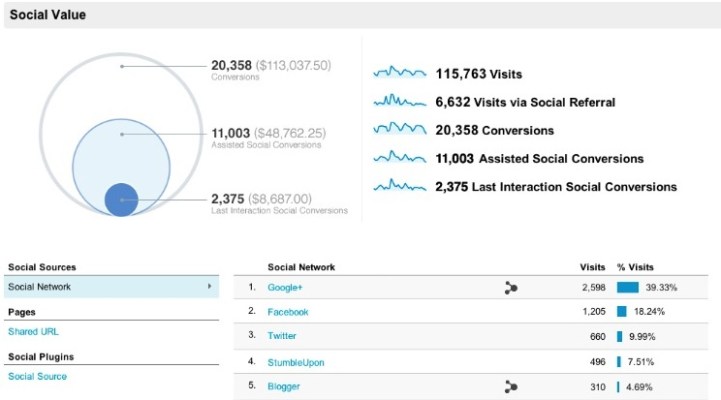If you’ve been to a marketing conference in the past year or so, or even read an article on the subject, you’ve probably heard someone ask, “What’s the ROI on social marketing?” (Alternate version: “What’s the value of a Like or a retweet?”) That’s what the new features in Google Analytics are trying to answer.
Given the increasing importance of social marketing and social network traffic, it was probably inevitable that the Google Analytics team would add social-focused reports. However, Group Product Manger Phil Mui says the new reports take a different approach than most social analytics products, which are more focused on “listening” — counting mentions, retweets, analyzing sentiment, and so on.
“Those are important metrics for sure,” Mui says. “But how do these metrics tie to the bottom line of a business? That’s what the CEOs most of the Fortune 500 folks that we talk with want to know.”
So companies using the new social reports can tell Google the goal that they’re interested in, whether it’s making a purchase, registering a user, or just having someone click on their about page. Then Google will show you not just how many visits are coming in from social networks (and which social networks in particular), but also how many of those social visits are “converting” to that goal. Mui says the reports also examine the impact that social networks have on a company’s “upper funnel” — in other words, the harder-to-measure cases where they don’t lead directly to a conversion, but may contribute indirectly. So if someone visits your website by following a link from Twitter, then returns in a week to buy something, Google will track that too.
Google can then assign a monetary value to both these “last interaction” and “assisted” conversions. That, in turn, helps companies decide whether the money they might be putting into a social marketing campaign on Facebook or Twitter is actually paying off.
There’s also an Activity Stream tab for tracking what people are saying about your company on social networks. It works with any social network that has connected to Google’s Social Data Hub. In the future, Software Engineering Manager Ilya Grigorik (who, along with some other members of the Google Analytics team, joined Google through the acquisition of social analytics service PostRank) says that other social sites could join, but for now, the big name on the hub is, of course, Google+. (Other participants include Digg, Disqus, and Reddit.)
Speaking of Google+, it’s hard not to notice the way that the social network seems to be creeping into Google’s other products. Mui says that in this case, Google wanted to make sure it followed its famous “do no evil” policy, which means that it provides “the most transparent measurements of the various social channels whether it is Google+, Twitter, Facebook, Digg, or Delicious.” He adds that he’s confident that as Google+ matures and grows, “it’s going to be of value to a large number of merchants and advertisers.”
Update: I forgot to mention when this is actually going live. Google says it will be rolling this out over the next few weeks. Google Analytics users will find the new features under the Standard Reporting Tab.
